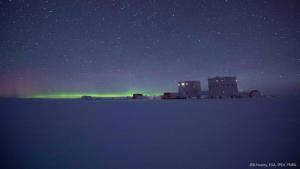Our future in space starts on Earth
Timed to coincide with the opening of an exhibition on space and Antarctica, ESA and the British Antarctic Survey are presenting the story “Step to the stars – our future in space starts on Earth”.

Follow the story of medical doctor Beth Healey, who spent over a year at the Concordia research station in Antarctica. Her mission: to conduct experiments for ESA on the international crew, preparing for future space missions.
Concordia sits on a plateau 3200 m above sea level. A place of extremes, temperatures can drop to –80°C in the winter, and the Sun does not rise above the horizon in the winter, forcing the crew to live in isolation without sunlight for four months of the year.
The narrative is featured in the WhiteSpace exhibition at the Space Station Dome, which is being held 7–12 June at the Times Science festival in Cheltenham, UK, .
The exhibition is organised with the support of the UK Space Agency, ESA and the British Antarctic Survey. It showcases an Antarctic-spaceflight analogue research laboratory, with interactive installations based on real experimental protocols. WhiteSpace will then tour science festivals, events and shows throughout the UK and possibly beyond.
ESA’s Anders Jordahl, who developed the Step to the Stars story with Beth Healey, says: “Nothing grips people like a good story. Beth’s story is real – and she tells it like you were living it yourself.
“Her adventures, of going through darkness to light, are both fascinating and inspiring. She has made an incredible journey.”
The story is also being made available to the public on the ESA website, starting on 7 June with the first two parts. Following parts will be posted over the coming weeks and months.
“Sharing such exciting experiences can certainly help in raising awareness about ESA scientific activities and inspire the young generation – in particular girls, we hope – to get involved in science, engineering and exploration,” says Anders.
Source: European Space Agency
- 305 reads
Human Rights
Ringing FOWPAL’s Peace Bell for the World:Nobel Peace Prize Laureates’ Visions and Actions

Protecting the World’s Cultural Diversity for a Sustainable Future

The Peace Bell Resonates at the 27th Eurasian Economic Summit

Declaration of World Day of the Power of Hope Endorsed by People in 158 Nations

Puppet Show I International Friendship Day 2020

